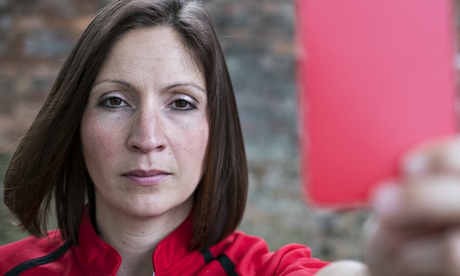
Refereeing rugby matches when you are a solicitor by day can be a treacherous position. Only a few weeks ago Claire Hodnett, who recently became the first woman to be appointed to the RFU's national panel of referees, had to appear at Nottingham crown court with a black eye.
"It wasn't ideal when I was appearing before a high court judge," she says, laughing. "I just ran past somebody who's arm flicked out and caught me totally by mistake, so I had a black eye for a week. There were a few questions over that one."
The 34-year-old specialises in childcare and child protection, advising social services and representing them at court hearings. She says the harrowing stories heard in her day job are exorcised by her daily workouts to meet her rugby fitness targets. "It's a good job, but it can be emotionally challenging. Luckily I can switch off when I need to, and it's a big distraction when I come to the gym at the end of the day. I'm training for something I absolutely love doing, but it's also my release mechanism."
Hodnett's story is an extraordinary one, the Shrewsbury-born amateur rugby player went from being a heavily overweight No8 to a female pioneer in elite rugby officiating, refereeing up to Championship level in the men's game next season and this summer at the Women's Rugby World Cup. Along the way she has transformed herself, physically, in order to meet the rigorous standards set by the RFU match officials panel.
"I played rugby at university level, but I was pretty crap to be honest. That may have been partly because of my size because I was enormous," she laughs, self deprecatingly. "Because I was significantly overweight and had two knee operations, I decided that playing rugby was not going to be possible. As I made that decision I happened to see a female referee at my local rugby club so I thought, 'I want to do that.'
"I went on a local rugby referees course and it turned out I was quite good at it. I would never have imagined when I said that I would get to the level I have done in the men's or women's game."
The hardest part of the journey was meeting the refereeing criteria, in particular the RFU's fitness test. "Whatever way you look at it women are made up differently to men," she says. "Men, generally, are naturally quicker than women. That is the bottom line. You ask Dr Nigel Chapman, a national assessor, and he'll tell you women's hips are made for childbearing and are therefore naturally wider which compromises our ability to run as quickly as men."
Hodnett trained hard to clinch the national standard – level 16 on the Yo-Yo test (a variant on the bleep test, which focuses on intermittent recovery) – "It almost killed me the first time I had to do it," she says, laughing, "but I can do it now."
The jubilation in Hodnett's voice at her achievement is evident. This, she says, is a story of sheer hard work and determination. "I'm absolutely over the moon, I'm still talking about it, telling everyone, I'm just so pleased I've been given the opportunity, I've worked so hard."
Asked whether she has encountered sexist attitudes on her journey to the top, akin to the criticism levelled at football match officials Sian Massey and Amy Fearn in recent years, Hodnett is vociferous. "Oh no, you just wouldn't get that in rugby," she insists, "because regardless of what people think of you as a person or as a referee the sport is a respectful sport and incidents of that kind are very few and far between.
"Some of the supporters will come up to me after the game and say, 'Oh I wouldn't have known we had a woman out there, you were really good.' From time to time you hear, 'Oh bloody hell, woman! He was offside!' but it's in the context of my decision was wrong, not you're a woman and that you're not good enough.
"I think being the first, I've had to really show the progress I've made but also my ability to continue to make progress because the games at this level and above get more challenging, their speed of skill, their speed of thought, everything happens so much quicker. I've had to evidence that, because some men, those that make decisions at the RFU or whatever body it is, haven't always been reassured that the females can do the job like the men."
A major encouragement, says Hodnett, was the appointment of Clare Daniels as assistant referee on the national panel some seasons ago: "Although she's not a referee and she hasn't had to make the same criteria as me, she has assisted me in the process because she's performing at a high level on the touchline week in week out."
Insiders tip Hodnett to reach the Premiership over the next few seasons, and the former Newark captain confirms that is her aim. "I would like to think I would give it a good go, but I am 34. If it's not me, I am absolutely convinced that another female will referee in the Premiership one day." she says. "There are younger females who are refereeing at a very high level who have the advantage of age on their side. I have no doubt there will be more women in the future, probably sooner than we think. But I am obviously going to give it a bloody good go."

